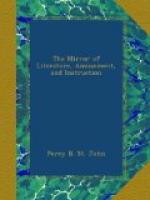And so here we are, once again on tiptoe for a merry Christmas and a happy new year. My good friends, especially my fair friends, permit me to wish you both. Yes, Christmas is here—Christmas, when winter and jollity, foul weather and fun, cold winds and hot pudding, good frosts and good fires, are at their meridian! Christmas! With what dear associations is it fraught! I remember the time when I thought that word cabalistical; when, in the gay moments of youth, it seemed to me a mysterious term for every thing that is delightful; and such is the force of early associations, that even now I cannot divest myself of them. Christmas has long ceased to be to me what it once was; yet do I even now hail its return with pleasure, with enthusiasm. But, alas! how differently is it viewed, not only by the same individual at different periods of life, but by different individuals of the same age; by the rich and poor, the wretched and the happy, the pampered and the penniless!
To proceed to the object of this paper, which is simply to throw together a few casual hints, connected with the period. I would beg my reader’s attention, in the first place, to an odd superstition, countenanced by Shakspeare, and which, if he happens to lie awake some night, (say with the tooth-ache—what better?—for that purpose I mean,) he will have an opportunity of verifying. The passage which contains it is in Hamlet and exhibits at once his usual wildness of imagination, and a highly praiseworthy religious veneration for the season. Where the ghost vanishes upon the crowing of the cock, he takes occasion to mention its crowing all hours of the night about Christmas time. The last four lines comprise several other superstitions connected with the period:—
It faded on the crowing of the cock.
Some say, that ever ’gainst that season comes,
Wherein our Saviour’s birth is celebrated,
The bird of dawning singeth all night long.
And then, they say, no spirit dares stir abroad:
The nights are wholesome; then no planets strike;
No fairy takes; no witch hath power to charm;
So hallow’d and so gracious is the time.
It is to be lamented that the hearty diet, properly belonging to the season, should have become almost peculiar to it; the Tatler recommends it throughout the year. “I shall begin,” says Steele, “with a very earnest and serious exhortation to all my well-disposed readers, that they would return to the food of their forefathers, and reconcile themselves to beef and mutton. This was the diet which bred that hardy race of mortals who won the fields of Cressy and Agincourt. I need not go so high up as the history of Guy, earl of Warwick, who is well known to have eaten up a dun cow of his own killing. The renowned king Arthur is generally looked upon as the first who ever sat down to a whole roasted ox, which was certainly the best way to preserve the gravy; and it is farther added, that he and his knights




